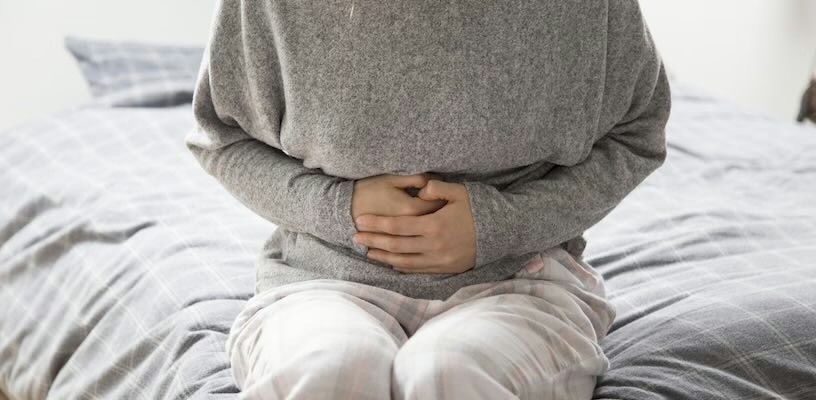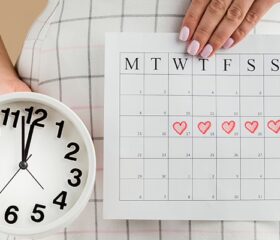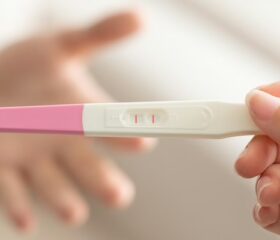Bloating During Ovulation: Causes, Timeline, and Treatment Tips
If you experience an uncomfortable, full feeling in your abdomen around the middle of your menstrual cycle, it’s probably ovulation bloating.

Ovulation usually occurs at the midway point of your menstrual cycle when one of your ovaries releases an egg for fertilization. 1 2 It’s not uncommon to experience bloating when this happens.
While this is generally not a cause for concern, it can certainly be uncomfortable. You can make it more bearable by understanding and avoiding certain triggers.
Is it normal to feel bloated during ovulation?
The short answer is yes—like we just alluded to, bloating is one of the most common ovulation symptoms, along with cramping and gas. 3
This symptom might be unwelcome, but it’s generally a normal part of a menstrual cycle. However, you should seek advice from your doctor if it becomes disruptive.
How long does ovulation bloating last?
Ovulation itself lasts for about 1–2 days. 4 If your bloating is directly triggered by ovulation, it probably won’t last much longer than that.
Other types of menstrual-related bloating
The unfortunate truth is that bloating is associated with other phases of your monthly cycle, too. This means you may experience menstrual bloating at any point in any given month (although if it doesn’t coincide with ovulation, it won’t technically be “ovulation bloating”).
- During your period
- Up until you ovulate (the follicular phase)
- While you ovulate
- Afterward, up until your period starts again (the luteal phase)
This means that if you’re hoping to use your bloating (or lack thereof) to gauge whether you’re ovulating, you may have trouble unless you also consider your other ovulation symptoms. We’ll examine this in more detail further down in this article.
What causes ovulation bloating?
Your hormones are mostly to blame for ovulation-induced bloating.
Around ovulation, your hormones fluctuate. Your changing levels of luteinizing hormone (LH) and estrogen can promote water retention and slow down your digestion, leading to issues like gas, cramps, and constipation—all of which can make you feel heavier and bloated.
Another possible cause is the size of your ovarian follicles, which are the sacs that carry your immature eggs. Your follicles are at their largest right before ovulation, which may further contribute to you feeling full and bloated.
How can you tell if it's ovulation bloating or something else?
Besides ovulation, bloating can be caused by many things (e.g., diet, stress, or chronic digestive disorders), which can make it tricky to pinpoint the culprit. 8 9
To figure out if you’re really ovulating, pay attention to your body’s signals. Your fertile period (around ovulation) is also associated with these signs:
- Egg white discharge: Your cervical mucus may become clear, slippery, and stretchy, resembling egg whites, in the 4 days leading up to ovulation. You may spot this ovulation discharge in your underwear. Alternatively, you can use a clean finger to check your discharge’s color and texture. 10
- Basal body temperature (BBT): Some people believe that after ovulation, your basal body temperature (BBT) may rise by about 0.4–1 °F (although this is by no means a universal experience and isn’t a perfectly reliable indicator of ovulation). 11
- Cervical position: Your cervix may become softer and harder to reach during ovulation. 12
- Ovulation pain: Some women experience a sharp pain or twinge in their lower abdomen on one side, depending on which ovary releases an egg. This is also called mittelschmerz. 13
- Other bodily signs: You may also experience breast tenderness, cramps, light spotting, and an increased sex drive around ovulation. 1
Consider using (and combining) tools, such as an ovulation calculator, an ovulation tracker app, and ovulation test strips to track the hormonal changes associated with ovulation.
Note that if you have irregular periods and an unpredictable cycle, it may be a little trickier to tell if ovulation’s the cause of your bloating or not. Talk to your doctor if you’re having trouble getting a handle on your cycle; they can point you in the right direction.
Ovulation bloating vs. PMS bloating: how can you tell the difference?
It’s easy to confuse ovulation bloating with PMS-related bloating, especially if you don’t know exactly when each phase occurs in your cycle.
The most obvious difference lies in the timing, but even that can get a bit murky:
- Ovulation bloating: As mentioned, ovulation occurs midway through your cycle, about 14 days before the start of your next period (in a “normal” 28-day cycle). 14 If your cycles vary unpredictably, ask your doctor how to track your ovulation with irregular periods.
- PMS bloating: PMS symptoms may start one to two weeks before your next period. 15 That two-week mark may line up with the end of ovulation (which, yes, is confusing). With that said, if you experience bloating closer to your period, it’s probably PMS.
Using a period tracker app to record your symptoms throughout your cycle can help you find a pattern and distinguish between the two.
How can you manage and relieve ovulation bloating?
Many strategies for managing bloating revolve around changing how and what you eat and altering other lifestyle habits that impact your digestive health.
Dietary adjustments to help you manage bloating during ovulation
Eating smaller meals throughout the day can ease digestion and prevent your stomach from feeling overly full. 16
These meals should also be nutritious. Load up on fiber and brightly colored fruits and vegetables (bananas and watermelon are great choices because they can help flush out sodium, which causes water retention). Don’t forget healthy fats from sources like avocados, nuts, and salmon. 4 17
You should also eat slowly; try to stretch your meals out over 20 minutes. Eat with your nondominant hand and chew 30 times per bite to slow yourself down. This takes a lot of focus, so avoid distractions while eating—no computer, phone, or TV while eating (try your best). 8
Here are a few other dietary tips to help reduce your bloating at any stage of your menstrual cycle:
- Hydration: Drinking plenty of water can help reduce bloating by flushing out excess fluid. Aim for at least eight cups of water per day. 17
- Ginger: Stock up on ginger tea or candy to help you reduce bloating. 4
- Probiotics: Probiotics can promote healthy gut bacteria, which may improve digestion and reduce bloating. 18
- Digestive enzyme supplements: These can help your body break down food more efficiently and reduce bloating and gas. 19
What to avoid to reduce bloating during ovulation
Focus on eliminating trigger foods from your diet. Unfortunately, that means you need to cut back on chocolate and salty, spicy, acidic, and fatty foods. 16 17
You should also limit how often you eat processed foods like bread, cold cut meats, pizza, frozen entrees, fried foods, chips, snack foods, and canned food (soups, meats and vegetables). 20
Additionally, pay attention to how often you’re: 16 17
- Swallowing air: Eating too quickly, drinking carbonated drinks (including sparkling water), drinking from a straw, and chewing gum can introduce excess air, which leads to trapped gas and bloating.
- Smoking and drinking alcohol: These habits can throw off the balance of bacteria in your gut and make you gassy. On that note, smoking while trying to conceive or drinking alcohol can also lower your chances of getting pregnant.
- Drinking caffeine: Think twice before grabbing that cup of coffee. Caffeine can overstimulate your digestive system and cause bloating. 21
What you do after eating also counts. Try to avoid lying down within 2 hours of eating. You also shouldn’t exercise immediately after having a meal.
Lifestyle changes to help you manage and reduce bloating during ovulation
Physical activity can improve digestion and reduce water retention. Even something gentle, like walking for 10 minutes—or 1,000 steps—can help. 22
Other wellness exercises like yoga, deep breathing, tai chi, and meditation can lower your stress (which can worsen digestive issues). 9 23
Other at-home remedies
If you’re dealing with uncomfortable bloating, you can also try:
- Stretching: Try lying on your back and pulling one knee at a time toward your chest for some digestive relief. 17
- Abdominal massages: Gently massaging your abdomen from right to left may help release trapped gas. To begin, lie down and gently rub your abdomen in a circular motion. Start on the lower right side near your pelvis and move upwards to your ribs, then across to the left side and down to your left hip bone (finishing at your belly button). Repeat this for 2–3 minutes. 24
If dietary and lifestyle changes don’t cut it for you, try over-the-counter anti-gas medication (with your doctor’s go-ahead). 21 Nonsteroidal anti-inflammatory drugs (NSAIDs), such as ibuprofen or naproxen, can help with cramps and pain during ovulation. So can acetaminophen, another very common OTC pain reliever. 13 25
When should you see a doctor about your ovulation bloating?
While bloating may occur at different points throughout your cycle, you should consult your doctor if your bloating lasts for more than 3 weeks or is severe and interferes with your daily activities.
You should also see your doctor if your bloating is accompanied by other concerning symptoms, such as:
- Severe abdominal pain
- Blood in your stool
- Unexplained weight loss
- Persistent vomiting or diarrhea
Your doctor can assess your symptoms, rule out any underlying conditions, and recommend appropriate treatment options. In severe cases, doctors sometimes recommend hormonal birth control to stop ovulation and alleviate associated symptoms.
Final thoughts
Ovulation bloating can be an unwelcome monthly visitor, but there are ways you can find relief. Make those mentioned dietary and lifestyle adjustments we mentioned above to manage your symptoms and minimize their disruption to your daily life.
Remember, if your bloating becomes severe or is accompanied by other concerning symptoms, don’t hesitate to seek guidance from your doctor.
Article Sources
- University of Utah Health. "Ovulation: When Is the Best Time to Get Pregnant?" Retrieved September 25, 2025.
- Cleveland Clinic. "Ovulation" Retrieved September 25, 2025.
- Northwestern Medicine. "Q&A About Ovulation With a Reproductive Endocrinology and Infertility Specialist" Retrieved September 25, 2025.
- NewYork-Presbyterian. "Cycle Syncing: How to Understand Your Menstrual Cycle to Reduce Period Symptoms" Retrieved September 25, 2025.
- Cleveland Clinic. "Bloated Stomach" Retrieved September 25, 2025.
- Kaiser Permanente. "4 phases of the menstrual cycle: How to feel your best around your period" Retrieved September 25, 2025.
- Cleveland Clinic. "Luteal Phase" Retrieved September 25, 2025.
- Harvard Health Publishing. "How to get rid of bloating: Tips for relief" Retrieved September 25, 2025.
- Harvard Health Publishing. "Stress and the sensitive gut" Retrieved September 25, 2025.
- Planned Parenthood. "What's the cervical mucus method of FAMs?" Retrieved September 25, 2025.
- Cleveland Clinic. "Basal Body Temperature" Retrieved September 25, 2025.
- Cleveland Clinic. "Cervix" Retrieved September 25, 2025.
- Cleveland Clinic. "Ovulation Pain" Retrieved September 25, 2025.
- UCSF Center for Reproductive Health. "Normal Menstrual Cycle" Retrieved September 25, 2025.
- Cleveland Clinic. "Premenstrual Syndrome" Retrieved September 25, 2025.
- Harvard Health Publishing. "Stomach troubles with no clear cause: Here's what you can do" Retrieved September 25, 2025.
- Northwestern Medicine. "How to Beat the Bloat" Retrieved September 25, 2025.
- MedicalNewsToday. "Can probiotics help with bloating?" Retrieved September 25, 2025.
- Harvard Health Publishing. "Can taking enzyme supplements help soothe my bloating?" Retrieved September 25, 2025.
- Vital Record. "You Asked: What happens to your body when you eat too much salt?" Retrieved September 25, 2025.
- University of Colorado Boulder. "Let it rip" Retrieved September 25, 2025.
- UCLA Health. "6 things you can do to prevent bloating" Retrieved September 25, 2025.
- Brigham Young University. "Stress and the Digestive System" Retrieved September 25, 2025.
- Michigan Medicine. "Abdominal Self Massage" Retrieved September 25, 2025.
- Harvard Health Publishing. "Mid-menstrual cycle pain (mittelschmerz)" Retrieved September 25, 2025.







